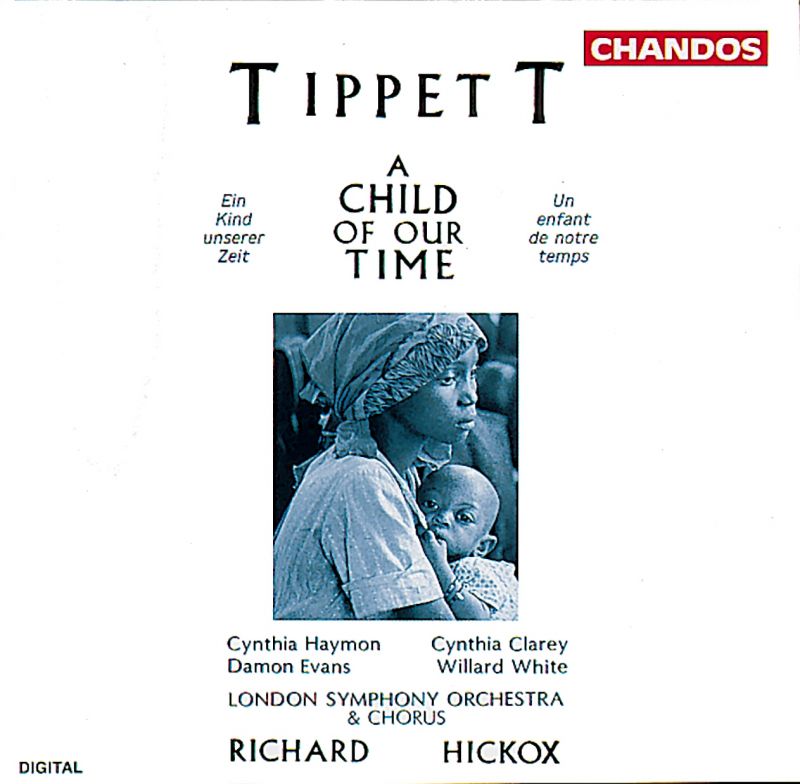Tippett A Child of our Time
View record and artist detailsRecord and Artist Details
Composer or Director: Michael Tippett
Label: Chandos
Magazine Review Date: 2/1993
Media Format: CD or Download
Media Runtime: 73
Mastering:
DDD
Catalogue Number: CHAN9123

Tracks:
| Composition | Artist Credit |
|---|---|
| (A) Child of Our Time |
Michael Tippett, Composer
Cynthia Clarey, Soprano Cynthia Haymon, Soprano Damon Evans, Tenor London Symphony Chorus (amateur) London Symphony Orchestra Michael Tippett, Composer Richard Hickox, Conductor Willard White, Bass |
Author: Arnold Whittall
Chandos's double Gramophone Award in 1992, in the Best Choral and Best Engineered categories, for their recording of Britten's War Requiem, naturally aroused great expectations for this new release from the same team. As a recording it is certainly excellent, with remarkable clarity of detail and a coherent, well-balanced texture which is more faithful to Tippett's range of dynamic markings than any other version. As an interpretation it also has its virtues but comparison with other recordings highlights some weaknesses too.
Richard Hickox's performance lasts some six and a half minutes longer than Sir Colin Davis's (Philips), and while such raw figures are meaningless in themselves, Hickox can confuse intensity with slowness. In the very first section, his response to Tippett's Sostenuto seems self-consciously deliberate: the spiritual ''Go down Moses'' is drawn out to an excessive degree: and the first three movements of Part 3 also drag. By contrast, Davis can seem over-impulsive, as in the 'tango' movement, which both Hickox and Tippett himself (Collins Classics) approach more broadly. But Davis's reading as a whole packs an enormous dramatic punch, and this is one oratorio that suffers not at all from being brought close to the opera house.
Hickox has the peerless London Symphony Chorus, and his team of soloists also promises well, without routing the opposition. Davis's contralto, Dame Janet Baker, is ideal: Cynthia Clarey is less focused in tone, and less responsive to the text. Cynthia Haymon has a rare ability to float high, soft notes, but in her aria in Part 1 she is slow and effortful beside Davis's Jessye Norman. Nor does the composer's own recording provide a serious challenge to Davis in Part 1. Hickox's Willard White is a strong bass soloist, but Damon Evans, though sounding appropriately younger than his rivals, has a vibrancy which becomes obtrusive on repeated hearings.
On its own terms, Hickox's recording is no small achievement: more polished than Tippett's far better as a recording than Davis's. In the end, nevertheless, it is less compulsively dramatic than the Davis, less sheerly moving than Tippett's own.'
Richard Hickox's performance lasts some six and a half minutes longer than Sir Colin Davis's (Philips), and while such raw figures are meaningless in themselves, Hickox can confuse intensity with slowness. In the very first section, his response to Tippett's Sostenuto seems self-consciously deliberate: the spiritual ''Go down Moses'' is drawn out to an excessive degree: and the first three movements of Part 3 also drag. By contrast, Davis can seem over-impulsive, as in the 'tango' movement, which both Hickox and Tippett himself (Collins Classics) approach more broadly. But Davis's reading as a whole packs an enormous dramatic punch, and this is one oratorio that suffers not at all from being brought close to the opera house.
Hickox has the peerless London Symphony Chorus, and his team of soloists also promises well, without routing the opposition. Davis's contralto, Dame Janet Baker, is ideal: Cynthia Clarey is less focused in tone, and less responsive to the text. Cynthia Haymon has a rare ability to float high, soft notes, but in her aria in Part 1 she is slow and effortful beside Davis's Jessye Norman. Nor does the composer's own recording provide a serious challenge to Davis in Part 1. Hickox's Willard White is a strong bass soloist, but Damon Evans, though sounding appropriately younger than his rivals, has a vibrancy which becomes obtrusive on repeated hearings.
On its own terms, Hickox's recording is no small achievement: more polished than Tippett's far better as a recording than Davis's. In the end, nevertheless, it is less compulsively dramatic than the Davis, less sheerly moving than Tippett's own.'
Discover the world's largest classical music catalogue with Presto Music.

Gramophone Digital Club
- Digital Edition
- Digital Archive
- Reviews Database
- Full website access
From £8.75 / month
Subscribe
Gramophone Full Club
- Print Edition
- Digital Edition
- Digital Archive
- Reviews Database
- Full website access
From £11.00 / month
Subscribe
If you are a library, university or other organisation that would be interested in an institutional subscription to Gramophone please click here for further information.




